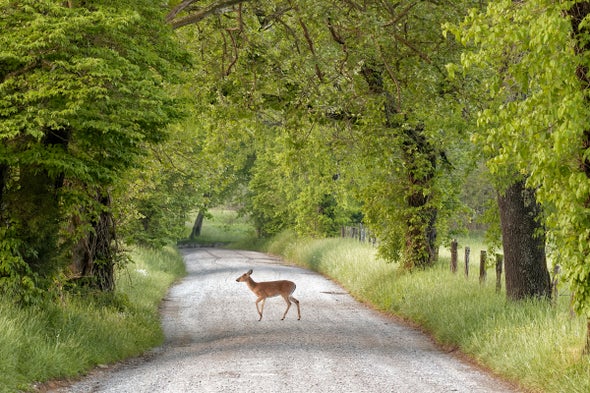(单词翻译:单击)
听力文本
This is Scientific American's 60-second Science, I'm Julia Rosen.
Don't worry about why the chicken crossed the road—the bigger question is whether it'll make it at all. Every year, millions of animals get killed by vehicles in the U.S. But that road risk has dropped because of the COVID pandemic.
"We're aware of negative impacts on the economy, family relations. I'm sitting in my living room, and I don't see as much of my family as I normally would. You know, so there's a lot of negative impacts. But the positive impacts are becoming more clear. And that could really change the discussion after the pandemic—change some of our assumptions about how much driving we should do if we want to protect nature, wildlife, air quality, climate change, and so forth."
Fraser Shilling, co-director of the Road Ecology Center at the University of California, Davis. When officials began issuing stay-at-home orders to slow the spread of COVID-19, Shilling and his colleagues quickly realized they were witnessing a novel experiment: What happens when we all start driving way less?
The answer is a lot of things, including fewer accidents and lower greenhouse gas emissions from cars. In their latest report, the researchers found that driving less has also led to a dramatic decrease in roadkills in three states for which they had long-term data: Idaho, Maine and California.
"It's actually the largest conservation action that the U.S. has ever taken, as far as I'm aware, since creation of the national parks."

The team documented about a third fewer collisions with deer, elk, moose and other large mammals in the four weeks following shutdowns. If such a slowdown persisted for a year, 27,000 large animals would be saved in just those three states.
In California, the researchers also looked specifically at mountain lions. Some populations in urban areas are at risk of local extinction, and vehicles are one of the top killers. However, in recent months, traffic deaths of mountain lions have dropped by 58 percent, revealing an important clue about how to save them.
"Well, to keep them from going extinct or to recover them, we need to protect them from traffic. And that means we need to build stuff. We need to put in fencing along highways and crossing structures over the highways. And that's a big deal."
People are now returning to the roads as stay-at-home orders are lifted. But Shilling hopes some of the lessons might stick.
"Yeah, I just say... I think we can grow from this. Having less impact on wildlife—everybody loves wildlife, you know—and if we can find a way to not kill them, it seems like everybody can line up behind that."
Thanks for listening for Scientific American's 60-second Science. I'm Julia Rosen.
参考译文
这里是科学美国人——60秒科学系列,我是朱莉娅·罗森。
不要担心鸡为什么过马路,更大的问题是鸡能不能过得去。美国每年都有数百万只动物因交通工具致死。但由于新冠肺炎疫情,这种道路交通风险有所降低。
“我们意识到经济和家庭关系受到的负面影响。我坐在客厅里,见到家人的频率也没有正常情况下多。因此,存在大量负面影响。但正面影响正变得越来越明显。正面影响可能会真正改变疫情后的讨论,会改变我们的一些假设,即如果我们想保护自然、野生动物、空气质量、气候变化等,我们应该将驾驶控制在何种程度。”
加州大学戴维斯分校的道路生态中心联合主任弗雷泽·希林说到。官员开始发布居家令以减缓新冠肺炎的传播时,希林及其同事很快意识到他们正在见证一项新奇的实验:我们都开始少开车时会发生什么?
答案涉及很多方面,包括交通事故减少、汽车排放的温室气体降低等。在他们的最新报告中,研究人员发现,在爱达荷州、缅因州和加利福尼亚州这三个他们拥有长期数据的州,少开车还令道路死亡人数大幅减少。
“据我所知,这国家公园建立以来,美国采取的最大规模的保护行动。”
根据研究小组的记录,在停工停产之后的四周内,鹿、麋鹿、驼鹿以及其他大型哺乳动物的碰撞率减少了约三分之一。如果这种停工持续一年,仅这三个州就有2.7万只大型动物会被拯救。
在加州,研究人员还特别观察了美洲狮。城市地区的某些美洲狮种群面临着区域性灭绝的风险,而交通工具是头号杀手之一。然而,近几个月来,美洲狮的交通死亡率下降了58%,这揭示了如何拯救它们的重要线索。
“为了使美洲狮名遭灭绝或恢复种群,我们需要保护它们不受交通的影响。这意味着我们需要建造一些设施。我们需要沿公路设置栅栏,并在公路上方设置穿越构造物。这是件大事。”
随着居家令的解除,人们现在回到了马路上。但希林希望人们能接受一些教训。
“没错,我想说,我们可以从这些教训中获得成长。对野生动物的影响少一些,每个人都喜爱野生动物,如果我们能找到不杀死它们的方法,似乎每个人都会支持。”
谢谢大家收听科学美国人——60秒科学。我是朱莉娅·罗森。
译文为可可英语翻译,未经授权请勿转载!
重点讲解
重点讲解:
1. make it (经历艰难困苦后)成功;
I believe I have the talent to make it.
我相信自己有成功的天分。
2. be aware of 注意到的;察觉到的;意识到的;
We are fully aware of the dangers.
我们充分意识到危险。
3. at risk of 处境危险;有风险的;在危险中;
An estimated seven million people are at risk of starvation.
估计有700万人面临着饿死的危险。
4. line up behind 支持;
Some surprising names have lined up behind the idea.
有些出人意料的名人也在支持这个想法。


